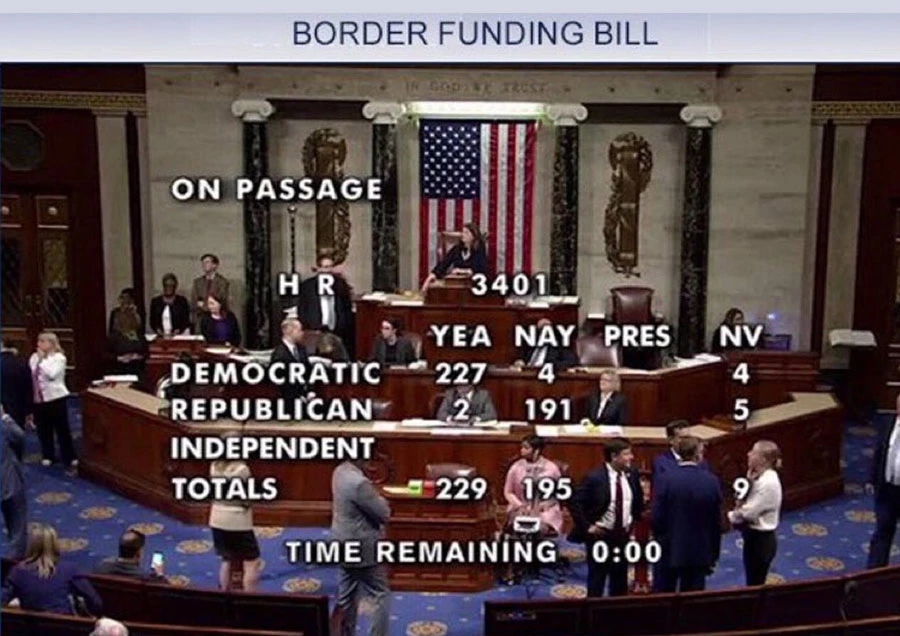Politics is my favorite soap opera
Politics is a dumpster fire worth watching
I love watching politics unfold; I always have. I try to keep an open mind and avoid echo chambers from either side because, let's face it, American politics often feels like a Red vs. Blue showdown, whether you love it or hate it.
Personally, I dislike this polarization. Most issues are complex and most people would fall into the middle of the political spectrum if given a blind choice. However, if a party takes a stance on a topic, its supporters often align their thinking rigidly with that stance instead of being open-minded and thoughtful.
Like I said; if given a blind choice on any particular issue, the average American would likely fall near the middle of the political spectrum. I'm going to leave this post open ended as both parties are constantly voting against their own interests to stay within party lines. For instance:
Example - Border Funding Bill

Former President Donald Trump actively encouraged his constituents to vote down a 2024 funding bill for the border patrol. His reasoning is clear: he doesn't want significant progress on border security until he is back in office. This move is controversial, especially considering his previous term.
During his four years as president, Trump focused heavily on building a wall along the southern border, a project that many critics argue was ineffective and costly. Despite the significant investment, the wall did little to stem the flow of illegal immigration. Now, by opposing the new funding bill, Trump appears to be prioritizing his political strategy over immediate solutions for border security.
Republicans in Congress, influenced by Trump's stance, shot down the 2024 border funding bill. This decision has sparked a heated debate about the best approach to securing the border and addressing immigration issues. Many argue that comprehensive reform and effective funding are needed now, rather than waiting for potential future leadership.
We all want security on the southern border
The reality is that most Americans want our southern border secured. However, there is a lot of disagreement on how best to accomplish this task. A small minority believes that the opposing side wants wide open borders, but this simply isn't true.
It's important to avoid echo chambers. If you only watch Fox News or MSNBC, you'll likely end up hating the other side, often for the wrong reasons. Keep an open mind. Before you react to something you read on Facebook that infuriates you, do some research, especially if you plan to share it with your friends.
If you spread false information, then you, my friend, are part of the problem of fake news. Just because a story or image fits your narrative doesn't mean it's right to spread lies. Being responsible and informed is crucial in today's polarized environment.
Gonna Be Wild
The 2024 election cycle is going to be wild. Both Kamala Harris and Donald Trump supporters are confident they have the election on lockdown. The truth is, it's going to be a close race, and the outcome will depend largely on voter turnout.
In theory, Democrats outnumber Republicans by a significant margin. About 30% of the U.S. population identifies as Republican, 28% identify as Democrat, and 41% identify as independent. However, most Independents, like myself, tend to lean left and vote mostly Democrat.
The challenge for Republicans is that they need to win over these left-leaning Independents. The challenge for Democrats is that many Democrats and Independents simply don't vote. This is why modern elections have been so close. If everyone got out to vote, our political landscape would look much different.
National Holiday
I really wish Congress would make Election Day a federal holiday. This change could significantly increase voter turnout by giving more people the opportunity to vote without work or other obligations getting in the way. In fact, I might start pushing this idea on social media to get it circulating again. If Kamala Harris wins the election, the idea could gain even more traction.
Efforts to make Election Day a federal holiday have been made in the past. For example, in 2018, a bill called the "Election Day Holiday Act of 2018" was introduced in Congress. This bill aimed to designate the Tuesday after the first Monday in November of every even-numbered year as a federal holiday, making it easier for citizens to participate in elections. In February of 2024 the "Election Day Holiday Act" was introduced but barely made it onto paper before dying. Despite a bill being introduced nearly every year not one has managed to gain traction.
Republicans often resist making Election Day a federal holiday because they know that large voter turnouts tend to favor Democrats. As long as Republicans control Congress, it is unlikely that such a bill will pass. However, if more people advocate for this change and the political landscape shifts, we might see progress on this front in the future.
If we can get a strong movement behind this idea, especially on social media, we might be able to pressure Congress into taking action. More widespread support could make it a reality, ultimately leading to higher voter turnout and a more representative democracy.
What do you think? Should Election day be a federal holiday? Let me know!



